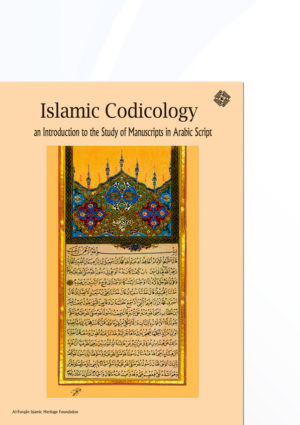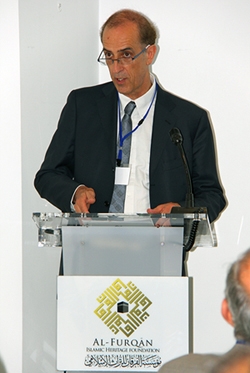
Dr Francois Deroche, a world expert on Islamic codicology, member of the Board of Experts at the Al-Furqān Foundation’s Centre for the Study of Islamic Manuscripts and Director of Studies at the Paris-based Ecole Pratique des Hautes Etudes, gave a lecture on the study of Islamic manuscripts in the 21st century at the new premises of Al-Furqān Islamic Heritage Foundation in London. The lecture which took place on 24th May 2012 was organised jointly by Al-Furqān Foundation and the Foundation for Science, Technology and Civilisation (FSTC) and was chaired by Mr. Sali Shahsivari, director of Al-Furqān Foundation.
Mr Shahsivari welcomed the distinguished audience before calling upon Mr. Sharaf Yamani to take the floor. Speaking in lieu of Al-Furqān Foundation President Sheikh Ahmad Zaki Yamani and representing the Foundation’s Board of Directors as well as its personnel, Mr Sharaf Yamani also welcomed the participants before moving on to give a survey of the efforts made by Al-Furqān Foundation in the preservation of the Islamic heritage. He mentioned especially the field of manuscripts which he said were surveyed, recorded, catalogued, critically edited and then published, using scientific methods, while also investigating ways of preserving them and means to facilitating access to them for the sake of future generations. Mr Yamani indicated that this was one of the reasons which led to the setting up of the Al-Furqān Foundation, while realising that the Islamic manuscripts are at the core of the Ummah’s legacy and a fundamental part of its identity, apart from being a historical, cultural and archaeological document which essentially reflects the soul and the specificity of the Islamic civilisation. He pointed out that this civilisation managed to integrate the worldwide Islamic heritage with all its various fields of knowledge and became the receptacle that incorporated the best of the scholars’ production and the essence of their experiences across the ages. In this respect, he insisted that this patrimony represents the Ummah’s soul as well as its intellect, charting out its thought and its conscience, and ultimately representing an essential component of the Ummah’s memory just as it is the firm bedrock for its present and future flourishing.
Mr Yamani then went on to explain the plan which Al-Furqān Foundation laid out for itself at the time of its inception in accordance with a scientific method and planned stages, saying that the Al-Furqān Foundation began by surveying the libraries which preserve manuscripts throughout the world. This was followed by the cataloguing stage which had never been carried out before. Finally, the manuscripts were edited and published.
In parallel, training courses were held on manuscript cataloguing and a number of conferences and seminars were organised.
Mr. Yamani reminded the participants that the first step the Al-Furqān Foundation made when it was set up in 1988 was a devise to an ambitious and comprehensive research project aimed at recording all of the Islamic manuscripts located in 106 countries of the world. It started with the cataloguing phase, focusing on the regions where instability, deprivation and financial hardship prevailed. When it ran into difficulties finding skilled cataloguers, it launched training courses in this field. So far, nine training courses have taken place in Cairo, Istanbul, London Rabat, Kuala Lumpur, Aleppo and Amman. At the end of the nine training sessions, 380 cataloguers acquired cataloguing skills, originating from the Arab countries, Africa, India, the Balkans, turkey, the former Soviet Union, EU, USA, Malaysia, Indonesia and Burma.
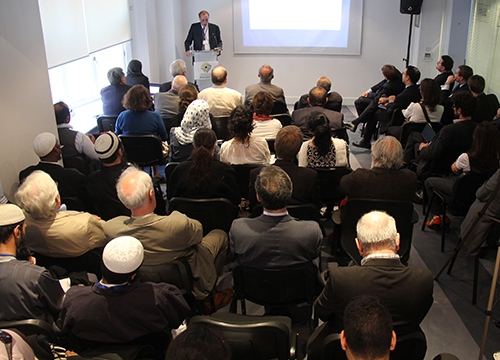
As far as publications are concerned, Al-Furqān Foundation has so far managed to publish more than 200 volumes in various fields, including manuscripts, the Sharī‘ah objectives, and encyclopaedic works on Makkah and Madinah. Among these, some 70 volumes were devoted to the cataloguing of a total of 65,000 manuscripts in different countries of Africa, Asia and Europe.
At the same time, Al-Furqān Foundation embarked on the critical editing of manuscripts of historical and scientific nature, covering disciplines like medicine, mathematics, history, geography, Qur’ānic exegesis and so on. This was done in co-operation with distinguished scholars with the aim of publishing the best works in our heritage, which are numerous, works that had been critically revised in accordance with the best scientific practices.
Meanwhile, in the first few months of 2012, Al-Furqān Foundation published the first part of the manuscripts of Dār al-Kutub of Egypt in four volumes and will soon publish those existing in the Dār affiliated libraries in 8 volumes. Furthermore, Al-Furqān Foundation will start in the next few months cataloguing some 22,000 documents related to the arts collections. Meanwhile, it has completed the cataloguing of Ayasofya’s manuscripts and other collections at the Suleymaniye Library, which are expected to be in 16 volumes, including a total of 8,000 documents.
In parallel, the Al-Furqān Foundation organised five conferences on Islamic manuscripts, which brought together a number of prominent researchers specialising in codicology from all over the world. Furthermore, the Al-Furqān Foundation organised over 30 lectures and awareness seminars in the field of the history of science, the fine arts, music, architecture, calligraphy, human rights, culinary art and so on, with a view to popularising the contribution of the scholars in the building of the Islamic civilisation. In addition, the Al-Furqān Foundation held a number of exhibitions covering painting and calligraphy.
When it realised that the field of Islamic heritage was in dire need of young experts in critical editing, the Foundation set up two training courses in the critical editing of manuscripts at Dār al-Uloom in Cairo. The next training course took place in June 2012 at Al-Az’har University.
As the Foundation’s activities had achieved the various stages of its workplan, it became apparent that prizes should be offered to prominent scholars who had published the most illustrious items of the Islamic heritage, thus bringing about awareness to it. The first prize went to Dr. Ihsan Abbas for his important contributions in editing Manuscripts. The second prize rewarded Dr. Salaheddin al-Munajjid, one of the early pioneer writers on our Islamic patrimony. Another prize, specially reserved for cataloguing in the first training course, was granted to Dr. Ramazan Şeşen, director of the Ghazi Husrev Beg Library in Sarajevo and the team that helped him in the cataloguing of his library manuscripts.
Last but not least, the Al-Furqān Foundation took yet another bold step to set up an international prize for critical editing. This is aimed at encouraging workers in the field of codicology to undertake the critical editing of their cultural and civilisational heritage.
Mr. Sharaf Yamani concluded his talk by pointing out that the Al-Furqān Foundation had recently began to transfer the all the catalogues completed on paper to digital databases that will be made available on the internet.
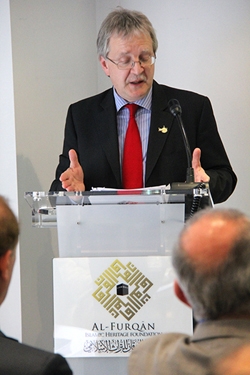
Next to take the floor was Dr. Peter Fell, Deputy Chairman of the Foundation for Science, Technology and Civilization (FSTC) for Strategic Affairs and member of its Board of Trustees. Dr. Fell welcomed the participants and praised their presence before giving a survey of the FSTC endeavours to revive Islamic scientific legacy, especially what is widely known as “the forgotten 1000 years” in the history of science-through various scientific and educational tools such as the exhibitions like the “1001 Inventions-Islamic Heritage Today”. Finally Dr. Fell welcomed the co-operation between his foundation and the Al-Furqān Foundation.
Dr. Francois Deroche also spoke about the beginning of his own interest in Islamic manuscripts in the last quarter of the 20th century. It was a copy of the Qur’ān he found in the Paris national Library that captured his attention at a time when few universities concerned themselves with manuscripts in general. Dr. Deroche said that the importance of manuscripts lie in the fact that they are a cultural and civilisational legacy , emphasising the need to make use of all the available means and techniques to preserve the sizeable number of manuscripts cramming many libraries, archive centres and museums across the world. He went on to warn about a tendency to exaggerate the number of existing manuscripts, saying that these do not exceed three million pieces, including manuscripts that consist of several copies such the manuscript Dalā’il al-Khairāt among others. In spite of the existence of an enormous corpus of manuscripts hidden in various public and personal libraries, which may deteriorate with time, the current estimates show important discrepancies. For example, Pakistan believes it has two million manuscripts, Timbuctu reckons it possesses close to one million, while realistic estimates range between 75,000 and 80,000 manuscripts in Mali.
Dr. Deroche concluded saying that codicology has progressed and become the subject of attention of a great number of researchers and students, owing to the importance attached to technical and scientific manuscripts. In the last 25 years of the last century, a great many scientific centres and heritage institutions came to being in the West, including the Melcom Foundation (Middle East Libraries Committee), and the work of Turkish scholar Fu’ad Fuad Sezgin, author of the book The History of Arab Heritage. There is also the case of the facsimiles of the most important Arab manuscripts existing in a number of the world libraries. Worth mentioning as well are very important Islamic archives on geography which have been published since the beginning of the 19th century. Other projects came to being which include the Qur’ān Project, the Timbuktu Project, Shahnameh Project, the Hamburg centre and finally, the Islamic Heritage Foundation, which has played a great role and made substantial effort in publishing a great many catalogues, edited manuscripts and organised training courses in the fields of codicology and critical editing.
Regarding the reason which led to the development of codicology, Dr. Deroche referred to many. First and foremost was the work of the Al-Furqān Foundation which has consisted of conducting a comprehensive survey of Islamic manuscripts in 106 countries. This survey produced detailed information on the manuscript content, which supplied heritage researches with priceless data. Then came the introductory book to codicology in the French language, which the Al-Furqān Foundation had translated into Arabic and English along with Adam Gacek’s book Taqlīd al-Makhŧūŧ al-‘Arabī (The Arabic manuscript tradition).
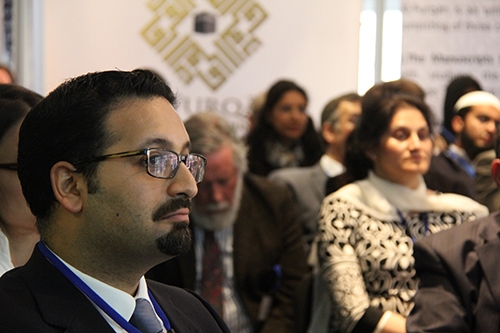
The second factor contributing to the expansion of codicology may be the development of information media, most prominent of which could be the Journal of Islamic Manuscripts issued by Brill and which is similar to the publication of the Manuscript Institute in Cairo and to the one in Iran. The third factor is, according to Deroche, the cataloguing of manuscripts by a number of institutions. In this respect, Dr. Deroche mentioned the Al-Furqān Foundation which has catalogued manuscripts that have not been catalogued before. The Al-Furqān Foundation began with cataloguing those manuscripts threatened with irreparable damage and loss, especially those in Africa, Eastern Europe and Asia. Dr. Deroche emphasised that the information contained in the catalogues is of great importance, particularly if the work on the catalogues is analytical and comprehensive in a way that gives a full and detailed description of the manuscripts. Indeed, whenever a manuscript is recorded in a comprehensive way, it gives a clear indication as to its real content and facilitates a better understanding of its scope, all of which enhances its value a great deal. This is especially so, concerning the description of the physical form of the manuscript, which covers the study of the physical paper, the various inks used, the kind of calligraphy and the method of numbering, the golden decoration, the binding and decoration, the size of the pages and the comments. This description also involves everything noted on the cover page: notes on reading certificates (samā‘āt), readings certificates (qirā’āt), certifications (ijāzāt), certificate delivery ceremonies (munāwalāt), text collations (muqābalāt), text confrontations (mu‘aradhāt), reading notes (mutala‘āt), recorded facts (taqyeedāt), religious endowment notes (waqfiyāt), the colophon and mention of the library copies. To be added to this is the study of the ownership which bears a great importance, in that it is likely to be of help in monitoring the influence of a manuscript on the writings of its various owners. And by following the different dates of ownership, it would be possible to know the way followed by a particular manuscript, and to determine an approximate date for it if not dated already.
It is incumbent on the cataloguer to mention the date of completion of a particular copy, the name of the scribe, and to determine- in so far as he can- the likely period and the place of the writing of the manuscript. Such data will help date the copy with precision, just as it will increase the knowledge of scholars and researchers.
As regards the fourth factor, Dr. Deroche mentioned the training courses which raised the level of awareness among the scholars interested in codicology and endowed cataloguers with the necessary skills. He pointed out that the Al-Furqān Foundation plays a leading role in this field. He mentioned that he himself organised three training courses in Cambridge, Madrid and Hamburg within a short period of time.
The fifth contributing factor is the organisation of exhibitions, while the sixth and final one is the use of the internet where many pages on codicology have been set up.
Dr. Deroche ended his lecture by calling for increased precision in the approach to codicology, saying that while in the past the focus was on the text, that is to say, the scholarly content of the manuscripts, our attention should henceforth shift towards the study and analysis of the content as a subject-matter. This a great challenge for us because we are at the beginning of the journey, he said, adding that in view of the great number of manuscripts, we must know where to begin.
Following the lecture, important questions were raised and debated extensively, including the issue of the transfer of the sciences and the manuscripts to Europe.
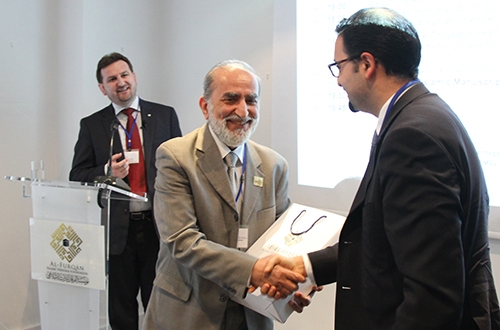
After Dr. Deroche’s speech, Mr. Sharaf Yamani offered a set of Al-Furqān Foundation publications to Dr. Salim al-Hassani, President of the Foundation for Science, Technology and Civilization, who in turn offered Mr. Yamani a copy of the book 1001 Inventions.


